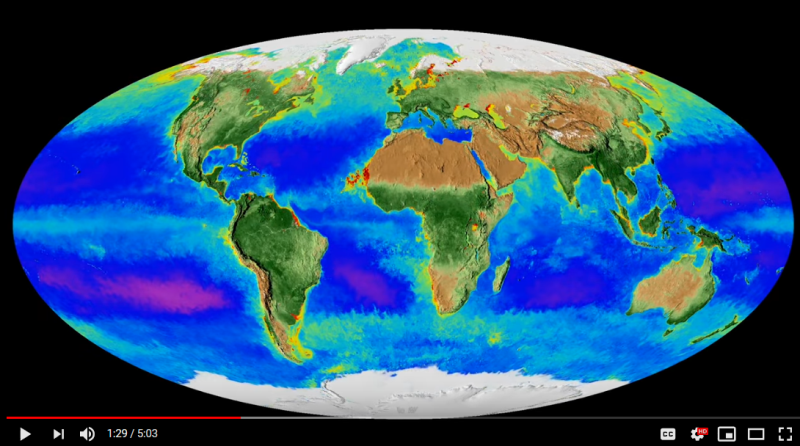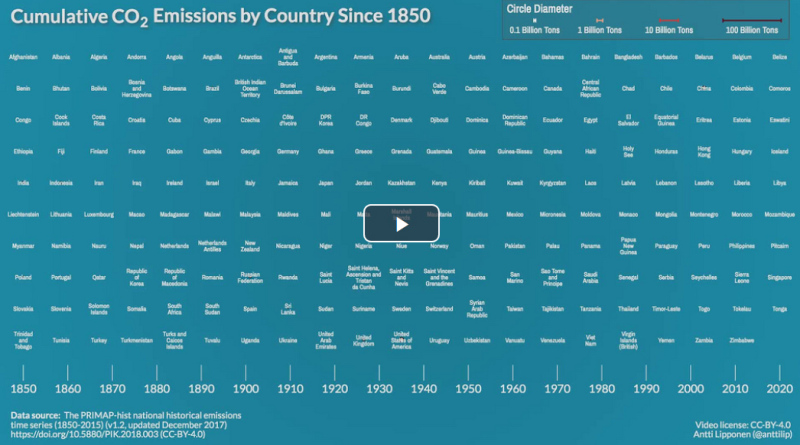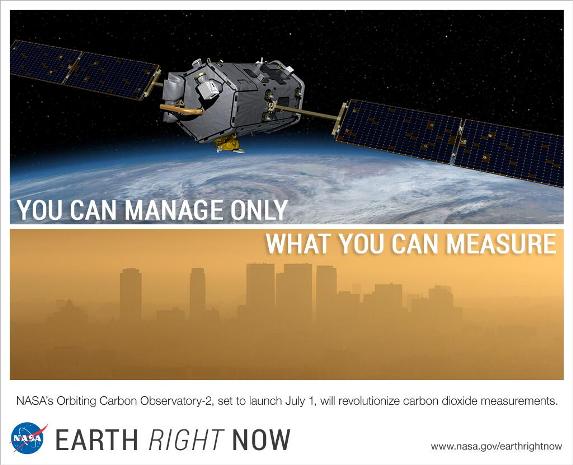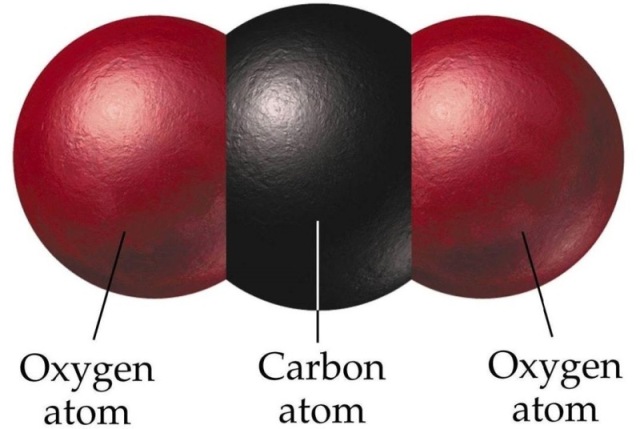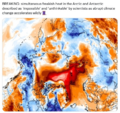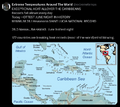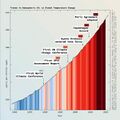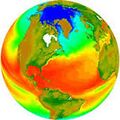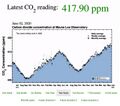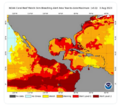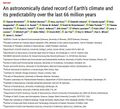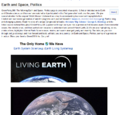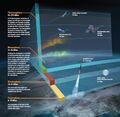Category:Earth System Science: Difference between revisions
Siterunner (talk | contribs) No edit summary |
Siterunner (talk | contribs) No edit summary |
||
| Line 20: | Line 20: | ||
<font color=green>○ ○ ○ ○ ○ ○ ○ ○ ○ ○ ○ ○ ○</font> | <font color=green>○ ○ ○ ○ ○ ○ ○ ○ ○ ○ ○ ○ ○</font> | ||
'''NOAA: Earth System Science @Work''' | |||
ESRL is monitoring and measuring everyday | |||
''The NOAA Earth System Research Laboratory (ESRL) pursues a broad and comprehensive understanding of the many physical, chemical and biological processes that comprise the Earth system to better predict their behavior from minutes to millennia on local to global scales.'' | |||
Revision as of 10:09, 6 February 2020
<addthis />
Planet Citizen Vision of Living Earth
○ ○ ○ ○ ○ ○ ○ ○ ○ ○ ○ ○ ○
NOAA: Earth System Science @Work
ESRL is monitoring and measuring everyday
The NOAA Earth System Research Laboratory (ESRL) pursues a broad and comprehensive understanding of the many physical, chemical and biological processes that comprise the Earth system to better predict their behavior from minutes to millennia on local to global scales.
Earth System Science
Earth system science (ESS) is the application of systems science to the Earth sciences. In particular, it considers interactions between the Earth's "spheres" — atmosphere, hydrosphere, cryosphere, geosphere, pedosphere, biosphere, and, even, the magnetosphere — as well as the impact of human societies on these components.
The Science Education Resource Center, Carleton College, offers the following description: "Earth system science embraces chemistry, physics, biology, mathematics and applied sciences in transcending disciplinary boundaries to treat the Earth as an integrated system. It seeks a deeper understanding of the physical, chemical, biological and human interactions that determine the past, current and future states of the Earth. Earth system science provides a physical basis for understanding the world in which we live and upon which humankind seeks to achieve sustainability".
(Via Wikipedia)
○
Connected, It Is a Complex Connected System
Only shifts commensurate with the scale of our existential crises have any prospect of averting them. Hopeless realism, tinkering at the edges of the problem, got us into this mess. It will not get us out.
The Earth’s systems are highly complex, and complex systems do not respond to pressure in linear ways. When these systems interact (because the world’s atmosphere, oceans, land surface and lifeforms do not sit placidly within boxes that make study more convenient), their reactions to change become highly unpredictable. Small perturbations can ramify wildly. Tipping points are likely to remain invisible until we have passed them...
Only one of the many life support systems on which we depend – soils, aquifers, rainfall, ice, the pattern of winds and currents, pollinators, biological abundance and diversity – need fail for everything to slide...
Radical action needed to confront climate change by George Monbiot @TheGuardian
○
Atmospheric Science
Measure to Manage: The Critical Importance of Atmospheric Science
2019 / 2018
Op-ed: The story behind the satellite that Trump wants dead
It’s difficult to describe all the ways this is stupid
- The Orbiting Carbon Observatory's primary job is to see what's happening to the carbon dioxide levels in our atmosphere.
There were plenty of striking things about February 12th's budget news, given that it contained lots of draconian cuts that were simultaneously restored because Congress had boosted spending the week before. But perhaps the most striking among them was an item in the proposed budget for NASA: Trump wants to block the follow on to a highly successful NASA mission.
To truly appreciate just how awful this is, you have to understand the history of that satellite and what it means to the scientific community as a whole. So let's step back and take a look at why the Orbiting Carbon Observatory (or OCO) exists in the first place. It turns out it was built specifically to handle some outstanding questions of the sort that people in the administration say are important, and killing its successor would mean the existing mission never lives up to its full potential.
○
Subcategories
This category has the following 17 subcategories, out of 17 total.
E
F
G
N
O
P
S
T
W
Pages in category "Earth System Science"
The following 89 pages are in this category, out of 89 total.
C
E
- Each of us can make a positive difference
- Earth and Space, Politics
- Earth Day
- Earth from NASA
- Earth Imaging-New Space
- Earth Right Now
- Earth Science Research from Space
- Earth Science Vital Signs
- Eco-economic Decoupling
- Ecolivia
- Ecosystem
- Environmental full-cost accounting
- Environmental protection
- Environmental Studies Online
- ESA Living Planet Announcement - May 2022
- European Union Green Deal - Fit for 55
G
- George E. Brown Jr
- Glasgow Climate Summit - Pledges, Promises, Declarations - What's Next Up
- Going Green
- Google Earth
- Google Earth Timelapse
- Green Education
- Green Futurist Literary Writers
- Green Politics 360
- Green Politics with GreenPolicy360
- Green Quotes
- Green Stories of the Day
- Green Stories of the Day - GreenPolicy360 Archive
- Greening Our Blue Planet
- GreenLinks
- GreenPolicy360 (eOS)
- GreenPolicy360 Archive Highlights 2013
- GreenPolicy360 Archive Highlights 2014
- GreenPolicy360 Archive Highlights 2015
- GreenPolicy360 Archive Highlights 2016
- GreenPolicy360 Archive Highlights 2017
- GreenPolicy360 Archive Highlights 2018
- GreenPolicy360 Archive Highlights 2019
- GreenPolicy360 Archive Highlights 2020
- GreenPolicy360 Archive Highlights 2023
L
P
S
Media in category "Earth System Science"
The following 200 files are in this category, out of 622 total.
(previous page) (next page)- 'Thin Blue Layer' of Earth's Atmosphere 2.jpg 800 × 486; 46 KB
- 'Thin Blue Layer' of Earth's Atmosphere xl.jpg 1,152 × 648; 79 KB
- 03-Scott-Kelly-NASA.jpg 800 × 500; 113 KB
- 2020 record temperatures.png 800 × 502; 358 KB
- 3M lawsuit re forever chemicals - June 2023.png 603 × 600; 357 KB
- 7-20-2020 GreenPolicy360 RT No.2.jpg 591 × 510; 125 KB
- A root and its mycorrhizal fungus surroundings.PNG 315 × 382; 236 KB
- A scorching year, what about the 360 warming data.jpg 600 × 706; 106 KB
- About Baselines and Change.png 592 × 312; 33 KB
- Above.png 500 × 375; 173 KB
- Acceptance on behalf of the United States of America.png 448 × 306; 62 KB
- Act now for a livable future.png 501 × 275; 272 KB
- Acting to make a positive difference - in St Petersburg Florida.png 600 × 723; 645 KB
- Actually watching the planet breathe.png 800 × 446; 649 KB
- Ag production and GHG emissions.jpg 680 × 510; 33 KB
- Alaska Willow - March 12 2023.png 576 × 230; 99 KB
- Alaska Willow News-March 12 2023.png 576 × 625; 235 KB
- Amazon deforestation timeline.jpg 800 × 417; 64 KB
- Amazon fires burn across the rainforest.jpg 800 × 504; 76 KB
- Andrew Wheeler confirmed to head EPA.jpg 753 × 600; 85 KB
- Anthropocene.jpg 450 × 187; 18 KB
- AOC re climate task force - july 8 2020.jpg 585 × 203; 38 KB
- Aquifers global earth observations by grace20150616-16 m.jpg 800 × 450; 117 KB
- Arctic - Antarctic - Breaking.png 639 × 600; 903 KB
- Arctic - Kolbert - 2023.png 553 × 476; 274 KB
- Arctic 30.1 C at 62.5 N.jpg 800 × 432; 80 KB
- Arctic heat in Russia-Siberia 2020.gif 784 × 408; 3.6 MB
- Arctic Melt - 1950-2020.png 640 × 349; 287 KB
- Arctic Siberia Heatwave - Again - June 2021.jpg 640 × 360; 83 KB
- Arctic-March30,2019.jpg 797 × 600; 126 KB
- Arctic-Siberia-6-20-2020.jpg 478 × 644; 148 KB
- Atmosphere Science.jpg 800 × 600; 45 KB
- Atmospheric Experiment of Humanity.jpg 519 × 574; 201 KB
- AU Too Hot.png 640 × 413; 286 KB
- Audubon study ms.png 529 × 434; 437 KB
- Aurora Time.png 829 × 780; 544 KB
- Banking - finance - climate - Mann-1.jpg 452 × 640; 162 KB
- Banking - finance - climate - Mann-2.jpg 452 × 640; 164 KB
- Battle for Democracy.jpg 640 × 123; 24 KB
- Bernie Sanders, Senate 2.PNG 800 × 517; 379 KB
- Bernie Sanders, Senate Aug 3.PNG 800 × 518; 388 KB
- Biden - clean energy ambitions.JPG 640 × 334; 31 KB
- Biden announces EV policies - Aug 2021.jpg 600 × 604; 112 KB
- Biden introduces leadership team - Nov 24 2020.jpg 800 × 644; 173 KB
- Biden re Earth Day 2023.png 640 × 400; 155 KB
- Biden selects Kerry as special climate envoy.jpg 592 × 505; 87 KB
- Biden urged to act - Oct 18 2021 - The Guardian.png 663 × 600; 497 KB
- Biden's assembled an all-star climate team 4-21-2021.jpg 682 × 732; 309 KB
- Biden-Sanders Unity Task Force on Climate.jpg 701 × 780; 139 KB
- Big Oil Rocked by News May 27 2021.jpg 639 × 600; 84 KB
- Bill McKibben switches gears-Sept 2021.jpg 518 × 265; 78 KB
- Bill Nelson on Global Temp Rise and Climate Change.png 640 × 353; 100 KB
- Bill Nye explains.jpg 543 × 508; 88 KB
- Bill Nye The Planet's on Fire.jpg 800 × 675; 106 KB
- Bioneers 2023 - ThirdAct.Org.jpg 624 × 600; 145 KB
- Bioneers Conf 2021- Buckminster Fuller Instit joins.png 469 × 586; 599 KB
- Bloomberg Carbon Clock 10-26-2021 8-47-05 AM EST.png 800 × 195; 356 KB
- Bloomberg Live Climate Data Dashboard.jpg 640 × 756; 156 KB
- Breakpoint - Reckoning with America's Environmental Crisis.jpg 329 × 500; 49 KB
- Bucky Trimtab.jpg 348 × 336; 88 KB
- Bug eyes in the rainforest canopy Photo by Don Perry-2.jpg 300 × 576; 24 KB
- Burst of climate denial as Trump presidency ends.jpg 632 × 604; 92 KB
- California's kelp forests and coastal biodiversity diminished.png 532 × 754; 307 KB
- Car heating and cooling.png 465 × 635; 261 KB
- Carbon Brief - Greenhouse gas levels 2021.png 640 × 436; 292 KB
- Carbon Footprint - BP-McKibben-Solnit-Aug2021.jpg 516 × 264; 66 KB
- Carbon Mapper - Launch - April 2021.jpg 800 × 323; 92 KB
- Caribbean Sea hot - June night 2024.png 676 × 600; 386 KB
- Cellular Landscape.jpg 300 × 336; 44 KB
- CFSV2 world temp July 3, 2023.png 600 × 800; 513 KB
- CH4 graph - 1980-2020.JPG 640 × 446; 22 KB
- Change.jpg 800 × 473; 73 KB
- Changes in carbon dioxide per 1000 years - via Climate Central.jpg 682 × 424; 34 KB
- China Record Heat - August 2022.png 800 × 1,343; 812 KB
- Christina Korp Earth Day and Apollo 8.jpg 519 × 264; 80 KB
- Citizens Climate Lobby - Save Our Future Act 2021.jpg 518 × 262; 77 KB
- Citizens Climate Lobby - Tampa Bay.jpg 586 × 515; 125 KB
- Climate Action 25th conf in Madrid.jpg 680 × 510; 22 KB
- Climate action isn't 'bunny hugging' says Boris.jpg 800 × 264; 95 KB
- Climate activist - Steven Schmidt - 1978 on.png 600 × 480; 174 KB
- Climate and National Security.jpg 603 × 533; 157 KB
- Climate Books - 2020.jpg 800 × 450; 69 KB
- Climate Change COP27 - Nov 11 2022 US Representatives.jpg 712 × 444; 54 KB
- Climate Change COP27 - Nov 11 Kathy Castor.jpg 712 × 710; 77 KB
- Climate Change Poses a Widening Threat to National Security.png 600 × 781; 310 KB
- Climate Change US EPA.jpg 600 × 703; 95 KB
- Climate Conferences 1979-2020.jpg 768 × 768; 121 KB
- Climate Crisis - Emily Atkin Heated No. 1.jpg 537 × 453; 61 KB
- Climate Crisis and the Global Green New Deal.jpg 293 × 418; 33 KB
- Climate debate.jpg 493 × 580; 129 KB
- Climate Desk.jpg 390 × 226; 21 KB
- Climate diplomacy is failing - June 2020.jpg 592 × 440; 71 KB
- Climate Emergency Institute - Oct 2022.png 610 × 600; 274 KB
- Climate Emergency Institute -- 2021.jpg 800 × 450; 55 KB
- Climate emergency.jpg 800 × 450; 69 KB
- Climate Headline News around the World - July 2023.jpg 600 × 704; 151 KB
- Climate Legacy of Biden.jpg 600 × 687; 265 KB
- Climate Models.png 639 × 558; 123 KB
- Climate News - Oct 28 2022.jpg 626 × 600; 88 KB
- Climate News - United Nations Report - Feb 2022.png 768 × 878; 539 KB
- Climate News Dec 4 2023 in Dubai.png 800 × 1,037; 649 KB
- Climate Plans Enforcement - Resources - GreenPolicy.png 768 × 897; 686 KB
- Climate poll - Florida.png 640 × 267; 36 KB
- Climate strike - Week 171.png 739 × 600; 834 KB
- Climate Strike Around the World - Sep20,2019.jpg 700 × 830; 119 KB
- Climate Summit - Leonardo DiCaprio.png 600 × 663; 521 KB
- Climate Summit live updates - Nov 2 2021.png 751 × 600; 420 KB
- Climate Summit planned-1.jpg 800 × 301; 53 KB
- Climate Summit planned-2.jpg 800 × 187; 31 KB
- Climate Summit planned-3.jpg 800 × 278; 44 KB
- Climate Summit planned-4.jpg 800 × 241; 41 KB
- Climate usa 60 years on.jpg 800 × 480; 34 KB
- Climate365 NASA and science orgs measure and monitor.png 798 × 633; 165 KB
- ClimateNews 360.jpg 172 × 172; 9 KB
- ClimateNewsFlorida.jpg 448 × 191; 36 KB
- CO2 at Mauna Loa data - June 02, 2020 - 417.90 ppm.jpg 640 × 566; 66 KB
- CO2 cumulative emissions 1850 - 2021 - countries.jpg 640 × 462; 211 KB
- CO2 Emissions per Capita by Country 1960-2014.png 800 × 451; 424 KB
- CO2 emissions-around-the-world.png 800 × 595; 123 KB
- CO2 global pathways via IPCC AR6 - how will we respond.jpg 800 × 450; 57 KB
- CO2 photo.JPG 800 × 536; 88 KB
- COP26 Climate Summit concludes.jpg 600 × 800; 160 KB
- COP26 concludes - 2.png 648 × 467; 177 KB
- COP26 concludes - 3.png 648 × 713; 416 KB
- COP26 concludes.png 648 × 528; 329 KB
- COP26 in GLASGOW - 31 OCT-12 NOV 2021.jpg 800 × 264; 51 KB
- COP27 'opening speech'.png 640 × 460; 160 KB
- COP28 News - Dec 13 2023.png 800 × 898; 410 KB
- CopernicusEU - Sentinel5P Atmosphere Monitoring Mission - 2.jpg 795 × 1,477; 654 KB
- CopernicusEU - Sentinel5P Atmosphere Monitoring Mission.png 583 × 465; 222 KB
- Coral bleaching - August 2023.png 488 × 430; 261 KB
- Coral bleaching - NOAA - August 2023.png 488 × 338; 201 KB
- Costs of War US Post 9-11 War Spending.jpg 800 × 305; 60 KB
- Covering Climate Now.jpg 493 × 498; 67 KB
- Cradle of Civilization - and climate change.jpg 640 × 360; 70 KB
- Cradle to Cradle Products Innovation Instit.jpg 600 × 600; 72 KB
- CSDA Program and Planet.jpg 800 × 379; 99 KB
- Cumulative CO2 Emissions by Country Since 1850.png 800 × 445; 445 KB
- Dated record of Earths climate - Science Report Sept 10 2020.jpg 735 × 669; 192 KB
- Day before Earth Day, April 21, 2015.png 1,275 × 752; 1.66 MB
- Death Valley ... the heat, what its like.jpg 640 × 381; 62 KB
- Defend Our Future 6-1-2020.jpg 585 × 458; 103 KB
- Democratic Climate Plan-Introduced June 2020.jpg 528 × 561; 117 KB
- Democratic National Convention-62 climate speakers.jpg 443 × 407; 57 KB
- Democratic Party Climate Bill - Aug 2022.png 640 × 269; 70 KB
- Democratic Party pres candidates debate in Miami-June 2019.jpg 800 × 534; 124 KB
- Democratic presidential candidates on the Green New Deal.jpg 800 × 359; 57 KB
- Denying human-caused climate change.jpg 639 × 620; 129 KB
- DeSantis against climate science - 2.jpg 640 × 480; 122 KB
- DeSantis against climate science - again.jpg 460 × 640; 105 KB
- Don't Look Up ....jpg 430 × 543; 172 KB
- Don't Look Up.jpg 800 × 450; 104 KB
- Donald Trump-Jair Bolsonaro-March 2019.jpg 640 × 455; 57 KB
- Dove1 image.jpg 420 × 308; 26 KB
- Drawdown Solution Chart.png 800 × 450; 186 KB
- DSCOVR EPIC - July 20 2022.png 532 × 612; 315 KB
- DSCOVR-EPIC 187 1003705 americas dxm.png 985 × 985; 1.21 MB
- Earth - Pacific Ocean.png 504 × 602; 233 KB
- Earth AI - Feb 2022.png 482 × 480; 192 KB
- Earth and Space, Politics.png 796 × 765; 349 KB
- Earth Day 2021 - Climate Summit News-1.jpg 491 × 270; 127 KB
- Earth Day 50 years on.jpg 480 × 548; 107 KB
- Earth Day and Climate at the Center.jpg 595 × 604; 131 KB
- Earth Day Flag.png 400 × 267; 69 KB
- Earth Emoji.png 50 × 50; 2 KB
- Earth Information Center - 2022 Graphic NASA.png 800 × 981; 868 KB
- Earth Information Center - NASA 336.png 336 × 336; 279 KB
- Earth Information Center - NASA.png 768 × 769; 1.21 MB
- Earth Information Center from NASA.jpg 800 × 577; 94 KB
- Earth mapped.png 800 × 783; 254 KB
- Earth Observing System - fleet of satellites.png 740 × 576; 557 KB
- Earth POV from the ISS Cupola-m.jpg 800 × 480; 71 KB
- Earth s.png 194 × 167; 40 KB
- Earth Summit 1992-s.png 336 × 418; 283 KB
- Earth Summit 1992.jpg 600 × 746; 171 KB
- Earth System Observatory-1.jpg 580 × 833; 129 KB
- Earth System Observatory-2.jpg 580 × 831; 69 KB
- Earth trapping unprecedented amount of heat - NASA.jpg 468 × 373; 56 KB
- Earth Viewing from the International Space Station.jpg 496 × 307; 45 KB
- Earth-NASA.jpg 800 × 265; 39 KB
- Earth-upper-atmosphere-NASA.jpg 800 × 781; 327 KB
- EarthScience Missions via the EOS - 2022.png 800 × 219; 139 KB
- Economist.com global capital snapshot as of July 2020.jpg 800 × 477; 119 KB
- Ecostress Mission-Aug 2020.jpg 640 × 311; 85 KB
- EDF satellite - methane tracking.png 600 × 674; 388 KB
- Einstein - the whole of nature 1.PNG 444 × 619; 216 KB
- Elon Musk quote - gas externality price.png 680 × 320; 199 KB
- Emissions graph - gleick tw 2018.jpg 640 × 364; 37 KB
- End of coal power in UK - 1.jpg 800 × 868; 112 KB
- End of coal power in UK - 2.png 800 × 557; 225 KB
- End of coal power in UK - 3.png 800 × 562; 240 KB
- End of Coal Power in UK.png 800 × 925; 739 KB
- Energy - Electric Measuring and Monitoring.png 715 × 1,978; 862 KB
- Energy Charter Treaty.jpg 512 × 480; 74 KB
